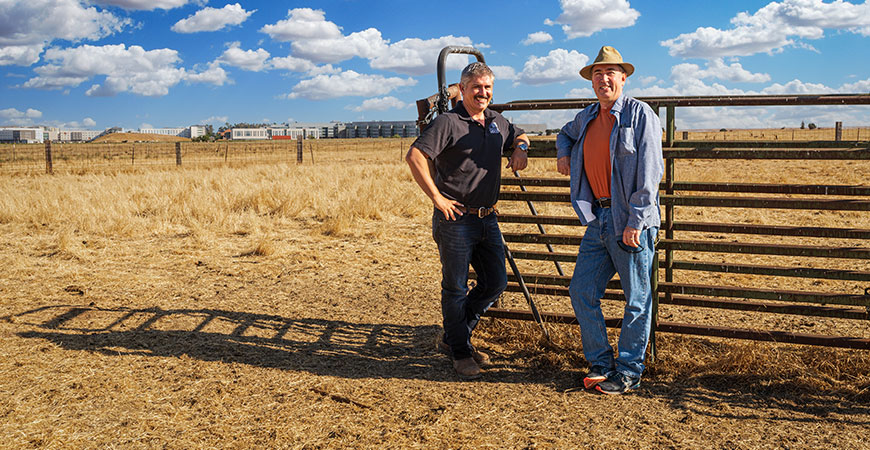
UCs Merced and Santa Cruz became the newest campuses in the system to be named an agricultural experiment stations (AES), UC President Michael Drake announced at today’s Regents’ meeting.
They are the first campuses in more than 50 years to earn the designation.
“With the AES designation, Santa Cruz and Merced have the potential additional funding from the University’s budget for (agricultural) research, and they will be able to make a stronger case for competitive grants in the larger research area,” Drake said. “Congratulations to these two new campuses on this wonderful milestone.”
An AES is a place-based scientific research center at a land-grant university that explores challenges and develops improvements to different aspects of the agricultural endeavor by working with farmers, ranchers, suppliers, processors and others involved in food production and agriculture.
“Our campus has been working toward this designation for several years and it really enhances the UC’s already considerable and potentially world-changing research,” UC Merced Chancellor Juan Sánchez Muñoz said. “It also helps fulfill the promise of the campus being located in Merced because so much of our research in agriculture is directly applicable to the communities of the San Joaquin Valley and many of our researchers at UC Merced are active in helping develop pathways to high-paying, skilled jobs in agriculture.”
Three other campuses — UCs Berkeley, Davis and Riverside — already hold the AES designation and bring their individual expertise to bear on California’s agriculture industry.
UC Merced adds an engineering perspective through its focus on precision agriculture, including robotics to improve the food-water-energy nexus. Researchers also look at agriculture through the lens of management of complex systems by examining water, climate and wildfire challenges; examine opportunities in soil health, air quality and the reuse of agricultural byproducts; and delve into social justice by investigating the labor force and agriculture’s effects on the communities of the San Joaquin Valley— including public health impacts and disparities.
“California faces climate resiliency and sustainable agriculture challenges on a statewide scale. Ensuring food, water and energy resiliency and a well-trained workforce in the future will require sustained, coordinated and committed multi-campus efforts,” Vice Chancellor for Research, Innovation and Economic Development Gillian Wilson said.
At each AES, campus-based researchers often work closely with Cooperative Extension specialists through UC Agriculture and Natural Resources (ANR).
“The San Joaquin and Salinas valleys are critical agricultural regions in California, where both UC Santa Cruz and UC Merced have long conducted research on agricultural issues. Having these two campuses receive this AES designation expands the UC’s agricultural research portfolio, which will help us develop the solutions needed for the many challenges California faces,” said UC Vice President for ANR Glenda Humiston.
Researchers also work across disciplines and with their counterparts at other campuses.
“The AES designation will allow us to expand our existing collaborations with Riverside, Davis and Berkeley, and strengthen our ties with Santa Cruz, especially through its expertise in agroecology,” said Professor Joshua Viers, who has served on the ANR Governing Council for several years and co-leads UC Merced’s new smart farm, which will become the campus’s AES facility. “The UC is a leader in sustainable ag practices and it is important that the emerging strengths and location of Merced be part of a climate resilient food future.”
UC Merced has already begun to be recognized for those emerging strengths by recent awards such as:
· $65 million from the federal Build Back Better Program to help develop the Fresno-Merced Future of Food Innovation (F3) Coalition to boost economic recovery after the pandemic. The funding will help launch a state-of-the-art agricultural technology hub that will serve and connect farmers across the San Joaquin Valley to industry and spark a new, more advanced era in agriculture-based technology in an effort to boost productivity, create jobs and build capacity for regional sustainability;
· $26 million from the National Science Foundation for an Engineering Research Center on the Internet of Things for Precision Agriculture;
· $20 million from the NSF and USDA for AgAID: AI Institute for Transforming Workforce & Decision Support, with Washington State and Oregon State universities;
· $3.1 million through the UC's Multicampus Research Programs and Initiatives for the Labor and Automation in California Agriculture (LACA) collaboration led by Merced to create a new model for agricultural technology that is farmer- and worker-friendly while enhancing productivity and environmental sustainability.
“Our designation as an agricultural experiment station is a major milestone for UC Merced. We are striving to bring fresh perspectives to agriculture by working at the intersection of agricultural technology, safe and equitable farm work and environmental sustainability,” said Professor Tom Harmon, faculty director of the Sierra Nevada Research Institute and co-leader of the smart farm. “A great example is the UC Merced-led multicampus initiative LACA. It's inspiring to see our hard work validated by this designation.”



